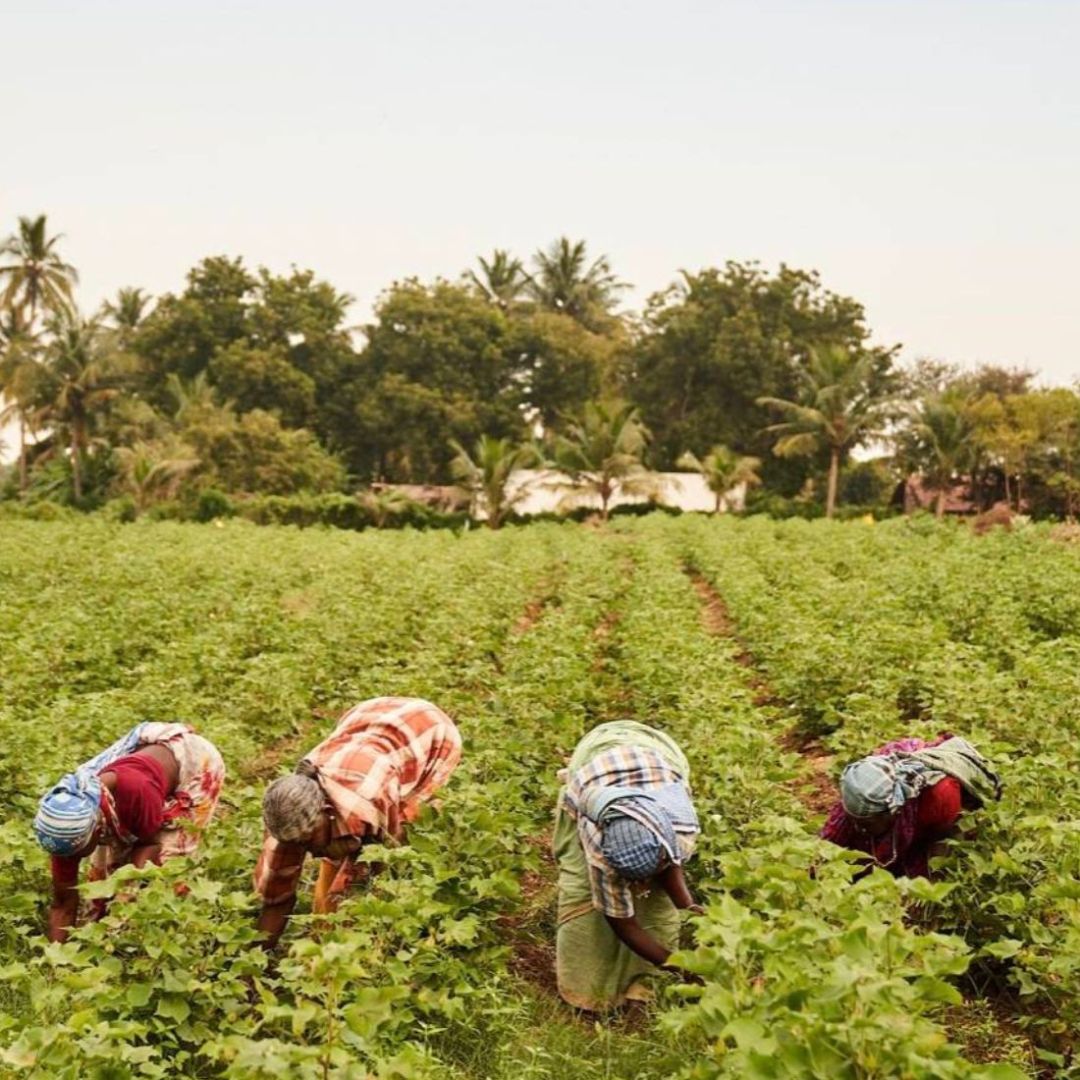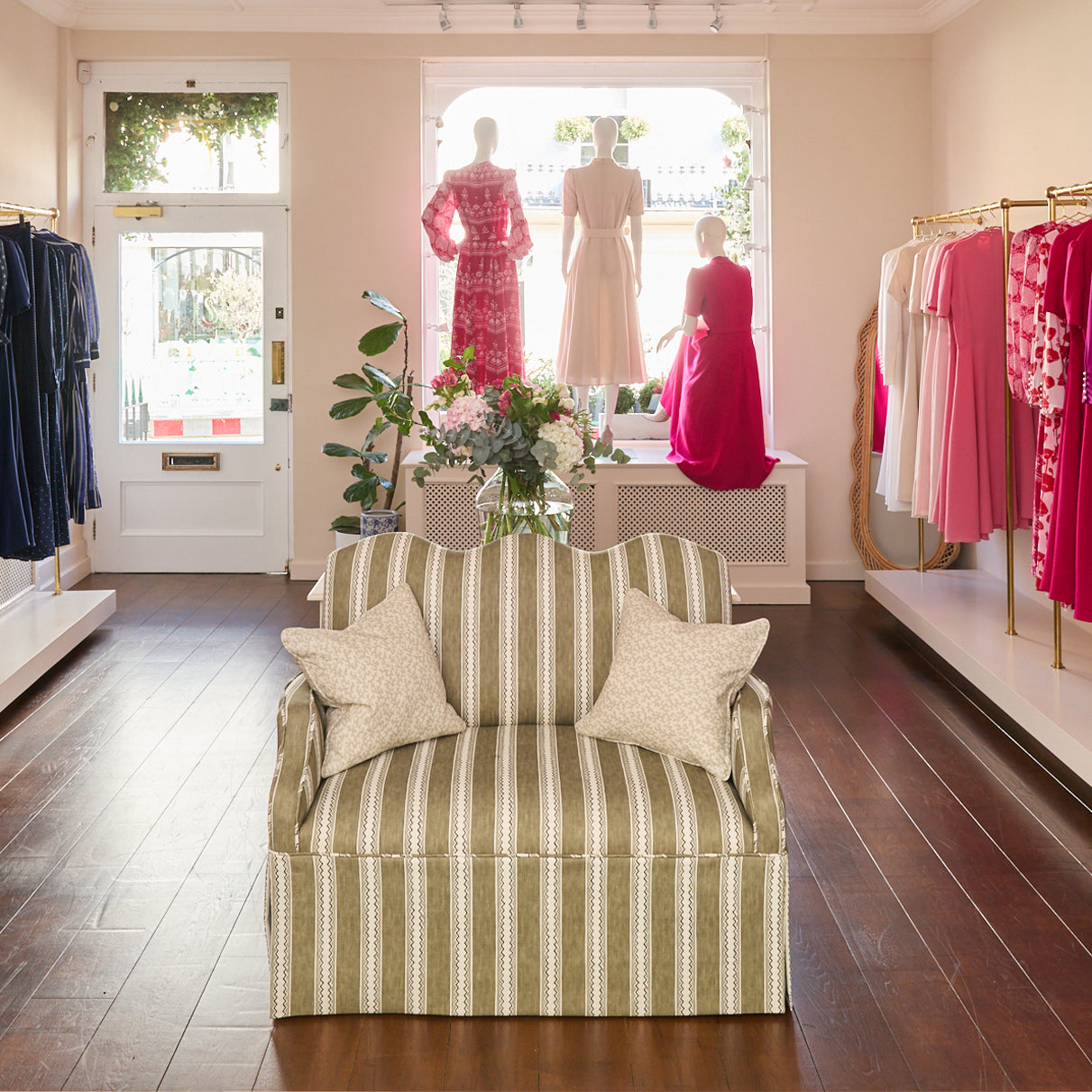
Grace Forrest, Founder of Walk Free, in our Grey 'LOVE' Jumper
In honour of Anti Slavery Day 2021
Beulah have designed two limited edition sweatshirts featuring slogans ‘Liberte’ and ‘Love’ in aid of Empowerment Collective, in association with international human rights group Walk Free. 10% of proceeds from the sale of the sweatshirts will be donated to the Empowerment Collective Beulah have designed two limited edition sweatshirts featuring slogans ‘Liberte’ and ‘Love’ in aid of Empowerment Collective, in association with international human rights group Walk Free. 10% of proceeds from the sale of the sweatshirts will be donated to the Empowerment Collective, and each sweatshirt wold will provide a week of skills training to a woman from disadvantaged backgrounds.
With an ethical and fully traceable supply chain the sweatshirts are made from 100% organic Indian cotton, using an eco-responsible production process that meets high environmental standards and in accordance with the latest version of Gots. The embroidery has been hand stitched by women in Senegal, via Csao, an organisation which creates jobs and provides artisan workers with sustainable incomes.

Grace Forrest, Founder of Walk Free, wearing Beulah's blouse which empowers vulnerable women, for British Vogue
Walk Free, founded by Grace Forrest, is an international human rights group focussed on accelerating the end of modern slavery and producer of the Global Slavery Index which identifies fashion as one of the highest risk industries for modern slavery. The Empowerment Collective, founded by Nasreen Sheikh, is a survivor-led frontline organisation fighting to eradicate modern slavery in Nepal. Grace and Nasreen work together to shine a light on the prevalence of modern slavery in the world today and to fight for the rights of all people.
Watch Nasrin and Grace's interview about modern slavery below.

Nasreen Sheikh for the Voice of Fashion, Founder of The Empowerment Collective.
Here at Beulah London, we were fortunate enough to have had interviewed Nasreen. Read below to check out Natasha's interview with the founder of the Empowerment Collective herself.
We are so inspired by your story & the cause you are fighting. Please can you tell us a little bit more about your story & what lead you to fight slavery and injustice?
The circumstances of my birth make it an absolute miracle that I am alive, and connecting with you Natasha Rufus Isaacs. My name is Nasreen Sheikh, I escaped forced marriage, child labour, and extreme poverty.
I come from a dusty undocumented village not found on any bookor map. A village where children are born on the floors of their familyhomes, and neither birth or death records are kept.
This is where I was born and began my journey as an undocumented person. In my village every girl is forced into marriage. When my older sister's marriage was arranged at 12 years old, my mom told me I would be next.
My life seemed destined for the sameoppressive path, I became a child labourer between theage of 9 or 10. Six of us lived, worked, and slept in a 10 by 10 room,without a bathroom or access to clean water.
I remember splashing cold water on my face to stay awake. There were moments when I felt my little fingers were working as fast as the machines. If we didn’t meet our deadline we wouldn’t get paid at all. We were forced to work 7 days a week for 10 to 12 hours a day, getting paid less than $2 a day. My only bed was thelarge pile of clothes I toiled over every day. At night I fell asleep on these clothes, wondering where they were going to, and who would wear them. I hatedthose clothes. They were woven with the energy of my suffering.
Help came to me in the form of a dog that led me to his kind guardian. Leslie John became my mentor and taught me how to read and write. His educational support allowed me to understand my own rights as a human being. In Kathmandu I saw women with deep trauma in their eyes, and emptiness in their malnourished bodies. I was determined to empower them. I founded a social enterprise Local Women’s Handicrafts in the same city where I was a former child labourer.
Tell us more about Empowerment Collective and the work you do?
Empowerment Collective is a nonprofit organization, dedicated to eradicating exploited labor, forced marriage, and extreme poverty.Our mission is to help empower and educate most underserved community, enabling them to write their own destiny. We provide a safe space for women who have escaped injustices and allow them to learn creative skills and crafts as a group to help heal and rehabilitate their spirits. We are inviting inspired people, businesses, government, and media, to address these injustices. Our 7 Keys for Global Human Rights Campaign holds the power tounlock unlimited human potential. The 7 keys are: Protected Environment, CleanWater, Nutritious Food, Safe Shelter, Quality Education, Health Care and Accessto Technology, we can provide power and choice to those who have been deprived.
10% of proceeds will be donated to the Empowerment Collective which will provide a week skills training to a woman from disadvantaged backgrounds. Tell us more about how this impacts one woman’s life?
We are extremely grateful for choosing to donate 10% proceeds to our small nonprofit organization all donation will go towards creative and economic empowerment for women. The fast fashion industry supports in humane working conditions. The majority of those affected are women, who labor for long hours without a fair wage. In sweatshops, women are limited to sewing only one part of a garment, when they are capable of so much more.
We provide marginalized women with education and creative skills training to become professional fashion designers, seamstresses, embroiderers, weavers, and jewelry designers. After program completion, the women have the choice to obtain a loan and open their own business, or negotiate a fair salary with potential employers. Through our program, women are gaining creative skills and financial independence. They are creating sustainable fashion that is life affirming and supports a healthy environment.
As a consumer, what actions can we take to fight modern slavery in supply chains?
I want consumer to connect from the source of manufacturing, please use your internet and mobile phone to educate yourself about supply chain, think beyond the price tag and consider the people who make your clothes. Read the label and ask the questions who made this, support ethical, sustainable, fair trade, brands and businesses like Beulah London& Local Women’s Handicrafts which is committed to fighting slavery through fashion.






